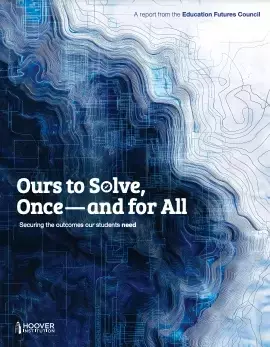Transforming America's Education System: A Comprehensive Roadmap for Equity and Excellence
In a groundbreaking report, the Education Futures Council, convened by the Hoover Institution, has issued a clarion call for a sweeping overhaul of the nation's K-12 education system. Citing "fundamental barriers" to student success and a failure to address the needs of minority and low-income students, the council has unanimously declared that the time for action is now, framing the issue as a matter of "public emergency" that demands immediate attention.Unlocking the Potential of Every Child: A Clarion Call for Systemic Change
Rethinking the "Operating System" of Public Education
The report takes a comprehensive approach, critiquing the existing structure of the nation's education landscape. The council argues that the current system, with its patchwork of local school boards, state agencies, and federal oversight, is not the product of "coherent and thoughtful design," but rather an evolution that has hindered, rather than helped, the pursuit of improved outcomes for all students.The council highlights a "perplexing contradiction" within the current system, where strong community support, dedicated educators, and robust research coexist with widely varying and often underwhelming academic results. Despite spending 40% more per student than the average OECD country, the U.S. ranks a dismal 34th in global math assessments, underscoring the urgent need for systemic change.Flipping the Script: Empowering Schools and Educators
At the heart of the council's recommendations is a fundamental shift in the "operating system" of public education. The report calls for re-organizing the system around a new "true north" that prioritizes student outcomes, minimizing top-down regulations and mandates in favor of incentives, and cultivating a culture of professional mastery among educators.Crucially, the council envisions a "flipped system hierarchy," where schools become the "apex organization," empowered with the discretion to make decisions and adapt their efforts to the unique needs of their students. This shift, the council argues, will foster greater trust, respect, and agency for teachers and principals, while providing essential support from other education leaders.Charting a Path Forward: Four Core Commitments
The Education Futures Council outlines four core commitments that they believe will be instrumental in transforming the nation's education system:1. Re-organizing the current system around a new "true north" that prioritizes student outcomes.2. Minimizing regulations and mandates in favor of embracing incentives that drive innovation and improvement.3. Cultivating and rewarding professional mastery within the education workforce, empowering educators to be the driving force behind change.4. Flipping the system hierarchy, placing schools at the center and granting them the autonomy to adapt to the needs of their students.Building Momentum for Change
To support the implementation of these recommendations, the Hoover Institution has announced the launch of a dedicated website next month, providing additional resources and details for readers and policymakers. Additionally, a summit is being scheduled for January at Stanford University, bringing together experts from across the country to discuss and debate the findings of the report.The council members conclude their introduction with a call to action, expressing their hope that this report will "build motivation and commitment for change" and help to "provide every child the foundational opportunities they deserve." The future of America's education system, and by extension, the nation's prosperity, hangs in the balance, and the Education Futures Council has laid out a bold and comprehensive roadmap for addressing this critical challenge.

